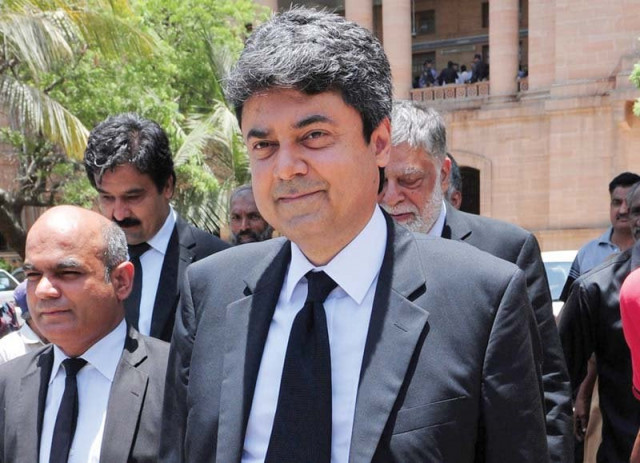Opposition must ‘avoid politics’ on Indian spy Jadhav
Minister warns India to gain if ordinance in line with ICJ verdict on Indian spy not passed

Federal Law and Justice Minister Farogh Naseem on Friday urged the opposition parties in the National Assembly not to create hurdles in the passing of an ordinance meant to allow Indian spy Kulbhushan Jadhav to file a review appeal against his conviction.
The minister, who rejoined the federal cabinet as the law minster earlier in the day for the third time in less than two years, rushed to the assembly to explain that the ordinance was in line with the International Court of Justice’s (ICJ) judgment last year in Jadhav’s case.
Persuading the opposition parties to avoid politics on a “highly sensitive issue” and “a matter of national importance”, the law minister clarified in the lower house that the promulgation of the ordinance was neither an “NRO” [safe passage], nor an appeal.
“An NRO is what Gen Musharraf promulgated to pardon sentences and suspend pending proceedings. We have to follow the ICJ’s decision as a responsible state,” he said.
In contrast to Federal Human Rights Minister Shireen Mazari’s provocative speech in the assembly on the issue a day earlier, Naseem’s speech appeared to be an effort on the government’s part to appease the opposition on a “sensitive issue” that could potentially create ripples.
Throughout his speech, Naseem showed utmost respect for the lawmakers of the PML-N and the PPP, saying they the item was on the agenda and the opposition should let it pass.
“I have never even called you a friend of [Indian PM] Modi,” he went on to say while responding to the slogan, “Modi ka jo yaar hai, gaddar hai gaddar hai (a friend of Modi is a traitor)”, raised in the assembly on Thursday by the opposition parties for the PTI-led government.
Through the ordinance, he said, the government was neither asking the Islamabad High Court to set aside the judgment, nor to overturn the conviction.
“All that the government has prayed before the court is to decide the matter in line with the ICJ judgment. If the ordinance was aimed at granting pardon to the Indian spy, the minister added, he would protested against it himself.
Referring to a talk show where it was implied that the ordinance was person-specific, the minister clarified that it would apply to future cases as well.
“The ordinance has been drafted as per the language used in the ICJ judgment,” he said, adding that it would remain valid for any other foreigner convicted in Pakistan in future.
“The ordinance is needed to follow the ICJ judgment so India could be stopped from approaching the United Nations Security Council against Pakistan,” he maintained.
“You may do politics on many other issues but this is very sensitive.”
The minister warned that India wanted Pakistan not to follow the ICJ verdict so that it could approach the UNSC for bringing all kinds of resolutions and sanctions and declare Pakistan a rogue state.
“Pakistan has to follow the ICJ decision since it is a member of the UN. By promulgating the ordinance, we have cut off India’s hands. Pakistan has done this responsibly.”
Giving the background of the case and repeatedly clarifying that he was not blaming anyone for the decisions taken in the past, Naseem said Kulbhushan was arrested on March 3, 2016, and the then federal government had decided against giving consular access to him because he was a spy and guilty of espionage.
“I’m not blaming anyone as no one has a crystal ball,” he said, adding that the past government must have taken the right decision under the circumstances.
He said that Pakistan could have backed out of the optional protocol back then and barred ICJ’s jurisdiction but that did not happen.
“It was the decision of the then federal government and a correct one. It had exercised its discretion,” he added.
Mentioning May 8, 2017, he said that it was an important date because India had filed the case in the ICJ. “We were unable to judge it correctly then… it was a cut-off date. After that, Pakistan could not come out of ICJ jurisdiction,” he explained.
Responding to the criticism why the government did not take the opposition in confidence before promulgating the ordinance, Naseem said the assembly was not in session and it was not written anywhere that the opposition should be taken into consideration before passing an ordinance. “Even the PML-N and the PPP didn’t do that when they were in power.”
The minister said the ordinance was published in the May 21, 2020 gazette.
“The Supreme Court has declared in numerous judgments that publishing in the gazette meant that it was a notice to the public at large.”
Naseem further said the opinion of international experts was sought before promulgating the ordinance.
A day earlier, the opposition parties had staged a walk out from the assembly on Thursday in protest against the government for “facilitating” the convicted Indian spy. PPP Chairman Bilawal Bhutto Zardari maintained that the PTI government was giving an NRO to the Indian spy.
Before Bilawal, PML-N’s Khawaja Asif accused the government of being Indian Prime Minister Narendra Modi’s friend and claimed that the Centre was facilitating Jadhav under international pressure.


















COMMENTS
Comments are moderated and generally will be posted if they are on-topic and not abusive.
For more information, please see our Comments FAQ